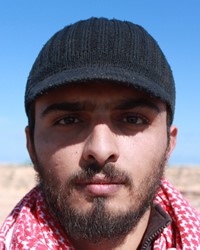Libya, which lies along the southern edge of the Mediterranean next to Egypt, is country that is largely desert or semi-desert. A large majority of the population of the country are Libyan Arabs or Arabized Berbers. They were mainly a nomadic society. Family life is a strong value for Libyan Arab families, and they still associate themselves with a particular nomadic Bedouin tribe.
Libya became independent from Italy in December of 1951. The discovery of oil in the 1950s radically changed the people's way of life. Muammar Gaddafi rose to power in 1969, and he remained a dictator until he was killed in 2011. During his many years in power, Libya enjoyed prosperity, but there was no tolerance for those who criticized the regime. Rebels who were not captured had to flee Libya, and some of them settled in neighboring Egypt.
Many Libyans in Egypt are refugees from the days when Gaddafi was killed and his long-standing regime ended. Anyone suspected of supporting the old regime was suspect; they faced torture or death at the hands of those who support the new regime. Tunisia, Algeria, and Egypt are all Arabic-speaking countries that border Libya, so many Libyans fled to these lands.
When give the chance to relax, Libyan Arab men enjoy soccer and talking over tea. Women and girls visit one another at home and enjoy family and religious celebrations, where they remain separate from the men who gather.
Polygamy is permitted among Libyans, and men are limited to four wives. Families are patriarchal, and the oldest male has the highest authority. The bayt, or tribal system group, includes three or four generations. The extended family is extremely important to Libyan Arabs, even in urban areas. Some Libyan men study in European and Egyptian universities.
Simon of Cyrene, who carried the cross of Jesus, was from Libya, and Cyrenian Jews carried the gospel back to Libya after Pentecost. Islam replaced Christianity in 624 A.D. Today there are almost no known followers of Christ in Libya. As Islamic militancy becomes more powerful in Egypt, Christians are leaving that country, which has always had a strong Coptic Church. The end result is less of a Christian influence in Egypt. Libyans have a poor chance of hearing the gospel in Egypt.
Libyan Arabs, even those in neighboring Egypt, are one of the most unreached people groups in the world. Most Libyan Arabs are not aware of what Christians actually believe. Because of their strong Muslim roots, even if they had an opportunity to hear the gospel, they would not initially consider the message as something that could possibly apply to them. Christian expats, such as engineers, oil workers, teachers, and computer experts could be sent to live, work, and share God's love with Libyan Arabs in Egypt and Libya.
Libyan businessmen and teenagers are also discovering the Internet, where Christian sites may lend additional witnessing opportunities in more of a private setting.
Pray for Libyan Arabs to find ways to use the Internet to access Bibles and other materials.
Pray that the few Libyan Arab believers would grow strong in the Lord, be protected, and have opportunities to be discipled.
Ask God to show believers creative ways to take Bibles and Christian materials to Libyan Arabs.
Pray that Libyans in Egypt will soon have the chance to embrace the King of kings.
Scripture Prayers for the Arab, Libyan in Egypt.
http://www.irinnews.org/news/2013/05/16/libyans-north-africa-scared-return-home
http://www.thearabweekly.com/?id=3452
http://www.varchive.org/tac/libyans.htm
http://www.newyorker.com/news/wendell-steavenson/libyans-in-egypt-a-very-complicated-feeling
https://www.libyaherald.com/2015/11/09/thinni-government-orders-finance-ministry-to-pay-7-5-million-for-libyan-students-in-egypt/
| Profile Source: Global Prayer Digest |











